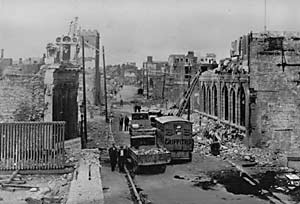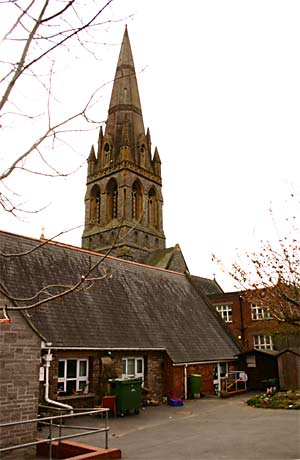
Exeter Stories
Exeter folk and friends in their own words - 1890's to the 1990's │ << Previous story │ Next story >> │
Link to Exeter blitz
James Bell - Clearing up after the raid
After the blitz Exeter citizens searched through the ruins for fuel. It was a common site to see scores of people with old prams, hand carts, and trolleys, loading them up with what they could recover from the damaged buildings. In order to put a stop to this, and to reduce injury, the authorities sent in gangs of men, bulldozers, and prisoners from Exeter prison. They made huge piles of wood at the top of Paris Street, Fore Street, and several places along High Street; fuel was only to be taken from these places.
There many priorities, and not enough people to carry them out. Every body did what they could. It was very sad to see aimless people wondering about in a state of shock even weeks later. My father brought two elderly ladies home, they had been laying on the grass in Southernhay for three days, with no shelter or any thing to eat or drink - they had been burnt out of Dix's Field and they stayed with us for two weeks.
There was an old lady sitting by the site of her house in Okehampton Street screaming for weeks, she had lost all her family, no one could do any thing to help her, in any case, they were far to busy.
When the buildings fell, most of the masonry was on the pavement. The thinnest part of the rubble was in the middle of the road, so a place to walk was made down the centre of the road - gradually bricks and rubble were thrown further back and small dry brick walls were built to keep the rubble back. Gangs of men, women and children, with a few soldiers worked to clear the roads for weeks on end. At first there was only one bulldozer available, there was some help from tractors, and shire horses. These were used when clearing the road of a girder or large beam which was too heavy to lever away.
You would see a number of men, some quite old, next to soldiers each with a crow bar or similar levering large obstructions out of the way. Sometimes girders were joined together and could not be moved until cutting equipment was used, this held the progress up. Girders often were laying right across the road, and could be moved, but had to much masonry attached or laying on them - a number of men would attack the masonry with sledge hammers and break the bricks up. Then perhaps they would get the shire horse in harness with a chain attached who would pull the girder round so that it could be levered to the side. Then on to the next one which was every yard or so.
We had no gas or electricity for about three weeks - we had oil lamps and cooked on a coal range - there was an indifferent water supply which had to be boiled. The gas main and electricity cables were broken at Exe Bridge, the Seven Stars hotel next to the bridge having received a direct hit.
Some shops salvaged what they could and set up make-shift stalls outside and sold things off very cheap, so a tin of sardines would be offered at 3d. a tin - in fact any thing that was in the shop even fittings. My father came home, all pleased, having bought some leather belts which were used to drive machines in a factory. He paid about a shilling for several yards, and they were used to repair our shoes. A lot of wide boys, and Spivs arrived selling all sorts of things, lots of black market stuff If you had the money you could get what you wanted.
After the bombing and the damage to domestic premises, the council sent men around to access the damage - roofs were repaired or covered with sheeting, and chimneys made safe. Broken windows were protected with a tar felt and one living room allowed a perspex protection which would let the light in. All the broken glass was to be placed in the gutter, which was later removed by men with shovels and a lorry.
There were a lot of pets around with nowhere to go, and an increase in feral cats during the next year.
The Scrap Iron Dumps
When the Iron railings and gates were removed, large quantities of them were dumped in Bonhay Pleasure Grounds and remained there for the rest of the War. It might have been all of Exeter's railings. It was said at the time that the iron smelters could not cope, with the quality, coming from all over the country, and the various types of steel recovered. But most of all was the lack of transport to take it to them. Most parks had fields guns, captured "trophies" from the first war. Bury Meadow I know had one, so did Heavitree Park, and Exwick. Bonhay Pleasure Grounds, had a bren gun carrier, and two large mortars from the Crimea. These were removed early in the war.
After the war each city received an allocation of steel, to assist rebuilding. They were awarded an extra allocation of steel for every ton of salvage. The authorities removed all the girders and large pieces of steel from the bomb sites and dumped it on top of the railings in Bonhay Park. It was piled up from the road to the river. Thousands of tons of it.
School restarts
After the Main blitz on May 4th 1942, I went back to school a few days afterword - St Davids Junior. There was only one girl called Betty Bastin (who returned). The head teacher, Mr. Bellman, came the next day and told us to report the following Monday. Only about twenty turned up. We did not have any lessons for the rest of May, or all of the following June. The register was called during June followed by organised games, with children from other schools. In July lessons recommenced and continued throughout August. We did not have our normal August Holiday. It was felt we had missed enough schooling.
© 2005 James Bell/David Cornforth
James Bell - was born in Exeter in 1932, to a Plymouth Brethren family, and was one of twelve children. This article is an edited selection from a series of emails I received relating his memories of Exeter during the Second World War.
 The authorities were still clearing up the High Street several weeks after the blitz.
Courtesy the Express and Echo
The authorities were still clearing up the High Street several weeks after the blitz.
Courtesy the Express and Echo
In June 1942, the Town Clerk, Cyril Newman applied for permission to use explosives to demolish some of the bomb damaged buildings - he was refused.
Exeter in the 1940's - Todd Gray
It was estimated that 178,733 cans, packets or parcels of food were examined by the authorities, and seven tons condemned as unfit for human consumption. The foodstuffs were damaged by flying glass and fire.
Exeter in the 1940's - Todd Gray
When the King and Queen visited Exeter a few days after the blitz, the King was shown a piece of shrapnel from a bomb that fell on the Cathedral. The King said "Send it for scrap" and the Queen remarked "That's right, let us send it back to the Germans".
From the Express and Echo 2004
 St Davids School still exists - it has been educating children since the 19th century.
St Davids School still exists - it has been educating children since the 19th century.
│ Top of Page │